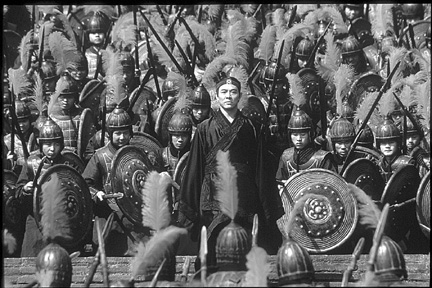 I need a ‘Hero’! I’m holdin’ out for a ‘Hero’ til the end of the night! Jet Li gets a huge military escort.
I need a ‘Hero’! I’m holdin’ out for a ‘Hero’ til the end of the night! Jet Li gets a huge military escort.
|
| Hero\r\nStarring Jet Li, Tony Leung, Maggie Cheung, and Zhang Ziyi. Directed by Zhang Yimou. Written by Li Feng, Wang Bin, and Zhang Yimou. Rated PG-13. |
|
A D V E R T I S E M E N T
|
|
|
|
A D V E R T I S E M E N T
|
|
Sharp Steel & Flowing Cloth
This Hero is a feast of visual beauty and martial-arts superstars.
By KRISTIAN LIN
When I interviewed Chinese filmmaker Chen Kaige in 1997 for a student newspaper, he mentioned his upcoming project, The Emperor and the Assassin. That movie was based on the true story of a murderer who was sent to kill the King of Qin, the monarch who created modern-day China in the third century B.C. by conquering the surrounding kingdoms and unifying them under his rule. Chen admitted thinking of having fellow director Zhang Yimou play the king, saying, “He has a very interesting face.”
Chen wound up casting another actor, but now Zhang has filmed his own version of the same story, called Hero. Where Chen’s 2000 movie was a relatively realistic take on the story, Zhang’s is much more fanciful. He utilizes the conventions of the wuxia (swordfighting) film that were reinvigorated in Ang Lee’s Crouching Tiger, Hidden Dragon, with warriors defying gravity and flying through the air as they do battle. The numerous fight sequences are enacted by a cast of martial-arts superstars that would reduce any fan of Hong Kong cinema to a state of trembling delirium.
Jet Li plays the nameless official who visits the King of Qin (Chen Daoming) at the film’s beginning. He’s given a hero’s welcome and a private royal audience because he’s there to tell the story of how he vanquished the three assassins who have been trying to kill the king: Long Sky (Donnie Yen), Broken Sword (Tony Leung Chiu Wai), and Flying Snow (Maggie Cheung). The narrative doubles and triples back on itself, as the king spots gaps and inconsistencies in the nameless one’s account, and different versions of the story play themselves out in flashback.
The movie’s biggest drawing card is its look. Along with Chen Kaige, Zhang became the face of mainland Chinese cinema in the early 1990s by directing sumptuous historical pageants (Raise the Red Lantern, To Live). At the millennium, however, his movies went small-scale and neorealist (Not One Less, The Road Home). Hero marks a return to his previous operatic métier, with expansive vistas, huge sets, and actors declaiming their lines. Other directors rely on computer imaging to create vast armies. Zhang does it the old-fashioned way with thousands of actual extras decked out in period costumes and assembled on the steps of the Forbidden City. (He does resort to computers, though, when he films a fight in which raindrops freeze in mid-fall and part to accommodate the dueling warriors.) That low-tech approach gives this epic a more substantive feel than Troy or even the Lord of the Rings movies.
The flashback structure lends itself to color-coding, as each section is given its own distinctive hue, often with entire sets draped in the same color as the actors’ costumes. A duel between Zhang Ziyi (as Broken Sword’s loyal servant and disciple) and Cheung takes place in a forest swirling with golden leaves that suddenly turn cherry-red, while a fight between Leung and Chen Daoming takes place in a palace hung with huge billowing swaths of jade-green fabric. The colors are saturated to the point of outrageousness by cinematographer Christopher Doyle, who has photographed nearly every high-profile Chinese-language movie in the last 10 years. The costumes by Emi Wada, replete with flowing sleeves, are star turns in themselves. The human labor is complemented by the splendid natural scenery, especially some awe-inspiring desert backdrops from China’s border with Kazakhstan. Even if you’re not a martial-arts fan, the sheer amount of eye candy on display here is a compelling reason to see the film.
And if you are a fan, there’s that cast. The actors are hamstrung to a degree by iconic characters, yet a baleful Leung and an icy Cheung bring a degree of shading to their roles (remember, these are the same lead actors from Wong Kar-Wai’s In the Mood for Love), while the stoic Li holds the center much more effectively than he does in his Hollywood outings. Still, it’s Zhang Ziyi who grasps most instinctively what to do. Her bristling anger, dark glee, and sexuality register more strongly than any other personality on this big canvas.
The actors do equally well by the fight sequences choreographed by Ching Siu-Tung, with Li’s muscular solidity contrasting well with both Cheung’s fluid grace and Zhang Ziyi’s athleticism. The Li versus Yen bout early on is the best one for pure technical aplomb, with Yen twirling around with a long spear. The director’s best sequence comes during a calmly lyrical scene in which Li and Leung cross swords while bounding lightly on the surface of a lake.
The film isn’t a masterpiece. The character motivations change every five minutes, and the story is choppy and disjointed. The movie tries to present people whose personal and political beliefs are at odds, but its attempts to deliver a statement on the nature of heroism fall short, or become lost in the translation. Hero lacks the emotion and high drama of Crouching Tiger, Hidden Dragon or the Kill Bill movies, but then Zhang Yimou’s romanticism is wholly distinct from Ang Lee’s classical restraint and Quentin Tarantino’s postmodern pizzazz. With such filmmakers reinventing the genre, the martial-arts movie is in full bloom.
 Email this Article...
Email this Article...

